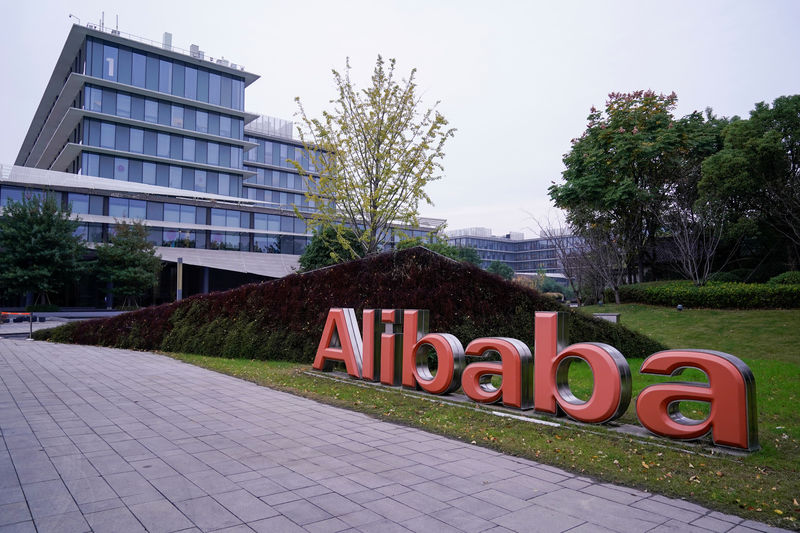By Scott Murdoch
HONG KONG (Reuters) - A late-year rush of giant global share sales led by Alibaba's $13 billion Hong Kong listing and Aramco's $26 billion initial public offering is failing to deliver an equivalent payday for equities bankers.
Filings on Thursday revealed 17 banks will split up to $32.3 million for Alibaba Group's (N:BABA) Hong Kong deal, which will raise up to $12.9 billion for the Chinese e-commerce giant.
Earlier this week, sources told Reuters that banks working on Saudi Aramco's IPO would split fees worth 0.35% of the amount raised, meaning at the top of its pricing range, raising $25.6 billion, fees would reach $90 million.
The numbers pale in comparison to the $300 million banks made from Alibaba's own record IPO of $25 billion in 2014. The record fee payout was the $550 million banks earned for the $19.6 billion IPO of Visa (NYSE:V) in New York in 2008.
Equity capital markets activity typically accounts for about a quarter of global investment banking fees, but capital-raising in 2019 is running at its lowest level since 2012 as a series of high-profile pulled deals and soggy floats have weighed on sentiment even as many indices hit record highs.
Worldwide, companies have sold shares worth $574.7 billion so far this year, according to Refinitiv data, 19.7% below levels this time last year. Those figures include Alibaba but not Aramco, which is yet to price its deal.
Office sharing start-up WeWork was forced to pull its IPO in September and seek a rescue deal after investors balked at its valuation.
The deal's failure was seen as a blow to other IPO hopefuls, already weakened by the performance of ride-hailing companies Lyft (O:LYFT) and Uber (K:UBER), which have both fallen by at least a third since their high profile flotations.
On Thursday, Czech consumer lender Home Credit dropped plans for an IPO in Hong Kong, which had been expected to raise more than $1 billion.
The poor reception for many IPOs comes despite strong stock markets. The S&P 500 (SPX) has risen 24% this year and sits just off an all-time closing high of 3122.03 reached earlier this week.
"I'd expect volumes to pick up in 2020 compared to what we have seen so far this year,” one Hong Kong equities banker said. “I think you need to remember 2018 was a very good year, so I think 2019 has been a return to more normal levels."
ALIBABA LISTING
Until Aramco prices its IPO, Alibaba ranks as the world's largest ECM deal this year, ahead of Uber's New York IPO which raised $8.1 billion and paid banks fees of $106 million.
Sources involved in Alibaba's latest transaction said the Hong Kong listing was always going to pay far less than an equivalent IPO because of the company's high profile and five years of investor familiarity with it via its New York listing.
Alibaba also held no roadshow of investor meetings - a typical feature of large deals and an organizational headache for leading banks.
"It’s one of the largest companies in the world, investors already know the story. The company had its quarterly results - people understand this company," said one banker involved with the deal.
China International Capital Corp (HK:3908) (CICC) and Credit Suisse (S:CSGN), lead the deal which launched last week and priced on Wednesday at a 2.9% discount to its U.S.-listed shares.
Citigroup Inc (N:C), JP Morgan (N:JPM) Morgan Stanley (N:MS) were joint global co-ordinators while HSBC (L:HSBA) (HK:0005) and Industrial and Commercial Bank of China (SS:601398) (HK:1398) (ICBC) also took senior roles.
Thursday's filing with the Securities and Exchange Commission (SEC) showed Alibaba would pay investment banking fees of $28.1 million for the sale of 500 million shares.
This would rise to $32.3 million if a so-called overallotment of an additional 75 million shares are issued, which bankers think will occur.
The fee split between the banks was not listed in the SEC documents but it is accepted industry practice that co-sponsors are paid the most and the remaining banks' fees are dependent on the amount of shares sold.
Alibaba's Hong Kong stock is due to start trading next Tuesday.

($1 = 7.8249 Hong Kong dollars)